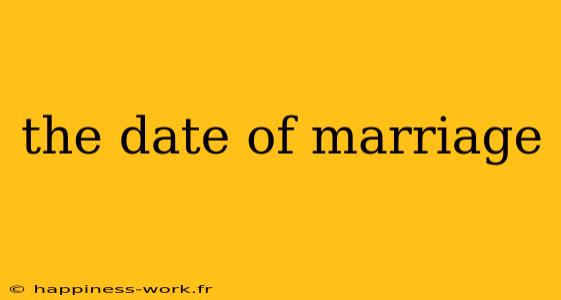Choosing the date of your marriage is one of the most important decisions in the wedding planning process. This seemingly simple choice can have a profound impact on the festivities, availability of venues, and even the emotional resonance of the day. In this article, we will explore the various aspects to consider when selecting your wedding date, the significance of this date in different cultures, and provide practical examples to guide you through the decision-making process.
Why the Date Matters
1. Symbolism and Tradition
The date of your marriage often carries a symbolic meaning. Many cultures believe in the importance of specific dates due to astrology, numerology, or historical significance. For example, some couples might choose to marry on dates that represent luck or love in their culture. Understanding these traditions can help couples choose a date that resonates with them on a deeper level.
2. Seasonal Considerations
The time of year can greatly influence your wedding's theme, location, and guest availability. For instance, a summer wedding may call for an outdoor ceremony, while a winter wedding could lean towards a cozy, indoor gathering. Analyzing the pros and cons of seasonal weddings can help couples narrow down their options.
3. Availability of Key Participants
Your wedding date should align with the availability of essential guests, including family, close friends, and even your officiant. Consider creating a shortlist of significant guests and checking their calendars before committing to a date.
4. Venue and Vendor Availability
One practical aspect to keep in mind is the availability of your desired venue and wedding vendors. Popular venues often book up a year or more in advance, especially on weekends during peak seasons. Research potential venues and inquire about their booking timelines to avoid any disappointment.
Analyzing the Best Time to Marry
What Time of Year is Best to Get Married?
The best time of year to get married depends on your preferences and the type of atmosphere you want for your wedding. Here’s a quick overview:
-
Spring (March - May): Often considered the most romantic season, spring weddings can feature beautiful blossoms and milder temperatures, perfect for outdoor ceremonies.
-
Summer (June - August): Known for long, sunny days, summer weddings allow for various activities and extended celebrations. However, this is also peak wedding season, so venues can be more expensive.
-
Fall (September - November): With vibrant foliage and cooler temperatures, fall can provide a picturesque backdrop for weddings. This season often has fewer weddings, potentially leading to lower costs.
-
Winter (December - February): Winter weddings can offer a magical and intimate atmosphere, especially around the holiday season. However, consider potential weather challenges depending on your location.
Special Dates to Consider
Some couples might choose special dates, such as anniversaries or dates with personal significance (like the day they first met). These dates can add sentimental value to the celebration. However, be wary of conflicts with other important events, such as holidays or local festivals, that may distract from your day.
Practical Examples
Example 1: If you're passionate about the autumn season and want a stunning outdoor wedding, consider a date in October, where the leaves are likely to be at their most colorful.
Example 2: If you're planning a winter wedding, consider early December when holiday decorations are up but the rush of the holiday season hasn’t fully begun. This allows you to enjoy the winter wonderland feel without the stress of holiday crowds.
Added Considerations
Day of the Week
The day of the week can significantly influence your wedding date. Saturday is the most popular day to get married but can come with higher venue costs. Consider Fridays or Sundays for potentially lower rates and increased availability.
Honeymoon Planning
Finally, consider the timing of your honeymoon. If you plan to travel soon after your wedding, ensure that the wedding date gives you ample time to unwind and prepare for your trip.
Conclusion
Choosing your marriage date is a significant part of the wedding planning process. It involves thoughtful consideration of cultural significance, personal connections, seasonal opportunities, and practical implications. By taking the time to analyze these elements, couples can select a date that is not only practical but also meaningful and memorable.
For more detailed steps on planning your wedding and selecting the perfect date, you can refer to resources on wedding planning websites like WikiHow, where you can find comprehensive guides authored by experts in the field.
By focusing on these various elements and personal preferences, you can ensure your wedding date is everything you hope for and more. Happy planning!
